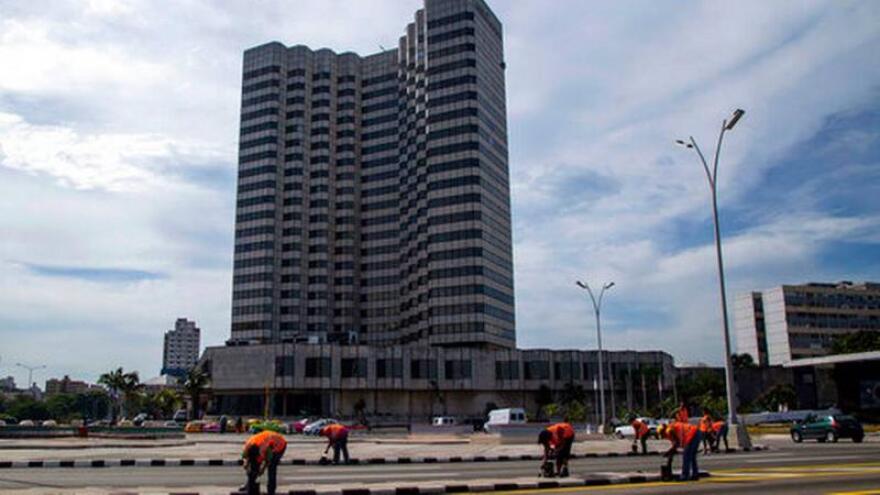By TIM PADGETT
APRIL 22 2019
Last week, National Security Advisor John Bolton came to Miami to announce President Trump is unleashing a tool of the Cuban embargo: Title III.
“Americans who have had their private and hard-earned property stolen in Cuba will finally be allowed to sue,” Bolton, to resounding applause, told hundreds of mostly conservative Cuban exiles at a luncheon for Bay of Pigs veterans.
Title III lets Americans – in this case mostly Cuban-Americans – sue companies that do business in Cuba on property taken from them by the communist revolution. No U.S. president has ever activated that embargo provision before – but Trump is on a campaign to get tough on Cuba again five years after his predecessor, Barack Obama, normalized relations with the island.
And that could keep Miami attorneys like Marcell Felipe very busy.
READ MORE: Did Trump Hand His Cuban Exile Fans a Meaningless Move on Title III?
Felipe heads the Inspire America Foundation, a pro-democracy NGO that’s advising lawyers who represent Cuban-American families including one who once owned property on what is now José Martí International Airport in Havana – assets the family says the regime confiscated in the 1960s without paying them.
“We’re in the process of identifying all of the different companies that would be implicated in trafficking on their property,” says Felipe – referring to foreign, non-Cuban firms using that property today.
“The airport,” he adds, “is a sort of ground zero, a hub where you’re going to have a lot of different foreign owners.”
This will have a chilling effect on new investments in Cuba. –Marcell Felipe
The family’s remaining anonymous until it files a lawsuit for restitution in a U.S. federal court. There could be thousands of suits like theirs, seeking millions of dollars. And, says Felipe, they’ll have a larger foreign policy aim:
“It will have a chilling effect on new investments in Cuba.”
If companies from countries like Spain, Canada, Russia and China face this kind of legal action in the U.S., they may think twice about setting up shop in Cuba. That could choke the island’s threadbare economy – and, the thinking goes, the regime itself.
“I think Title III is the strongest possible measure the U.S. can impose on Cuba,” says Ana Carbonell, a Republican political consultant in Miami and a Cuban exile activist.
“Those of us that believe in the need to further pressure that regime have requested for many years the implementation of Title III.”
Twenty-three years, in fact: Title III is part of the 1996 Helms-Burton law that strengthened the U.S. trade embargo against Cuba. But now that President Trump has pulled the Title III trigger – will it really work the way so many Cuban exiles hope it will?
BLOCKING LEGISLATION
“The devil is in the details,” says Cuban-American attorney Pedro Freyre, who heads international practice at the Akerman law firm in Miami and represents companies that may be targets of lawsuits brought by Cuban exiles who claim their property was confiscated.
Freyre says collecting on those claims will be hard if the companies being sued have no assets in the U.S. – and if their home countries don’t allow money from Helms-Burton actions to be collected there.
“Particularly in jurisdictions that have substantial investments in Cuba, like Canada or Spain, there’s already blocking legislation,” Freyre points out. “So even if you do obtain a judgment in the U.S., that judgment won’t be honored.”
Freyre adds there’s a reason that all these years this embargo weapon was little more than a threat. No president used it in the past for fear other countries might take similar actions against U.S. firms.
“All the presidents, both Democrat and Republican, perceived Title III as something that would be detrimental to U.S. interests – particularly business interests,” says Freyre.

It could also be detrimental to another U.S. interest: the economic well-being of ordinary Cubans – and Cuba’s fledgling entrepreneurs.
A tenth of Cuba’s workforce is employed by – or owns a small business that benefits from – tourism businesses. And foreign firms are heavily involved in those – often on confiscated property. Robert Muse is a Washington D.C. attorney who helps companies navigate the Helms-Burton law.
“I can see a number of instances where a European hotel group that’s invested in Cuba – if they’re driven off the island by Helms-Burton lawsuits, the Cubans they’re employing, and Cuban entrepreneurs, are going to be out of work,” says Robert Muse, a Washington D.C. attorney who helps companies navigate the Helms-Burton law.
But Felipe of the Inspire America Foundation argues those companies mistreat Cuban workers, because they let the Cuban regime set the terms and pay for hiring employees.
“All these foreign profiteers that are in violation of Title III are doing this exploitation of Cuban workers themselves,” Felipe insists.
Either way, legal experts say President Trump’s decision to let Cuban exiles sue companies operating on their confiscated property in Cuba may not affect U.S. companies, like American Airlines and Carnival Cruise Line, because they only transport visitors to and from the island.



